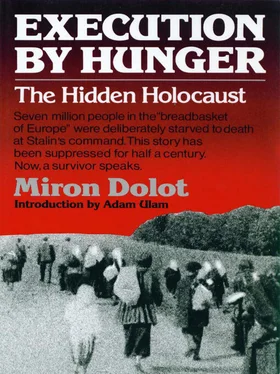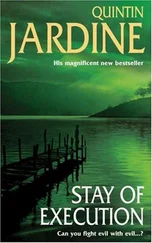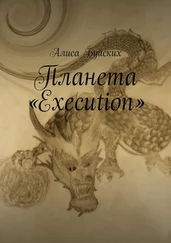This first death affected the people in the car. The crying and shouting, as well as the quarrels and disagreements ceased. Everyone realized that the next dead one might be he or she.
The train moved forward slowly but steadily. It became colder. Contrary to everybody’s expectations, the train did not stay long at the Moscow freight station. After a short stop, it gave a prolonged whistle and moved forward again. Those who sat close to the walls could see the lights of Moscow through the cracks.
The next stop was Alexandrov. By then, it had become unbearably cold, and the inmates of the train were suffering severely. Here Vasylyk lost his mother and sister. His mother who had fallen asleep sitting in the car, was stricken with a heart attack and never awakened. When her body was taken away, her daughter was permitted to step out of the car and follow the bearers. Vasylyk and his father were denied this privilege. When the bearers returned to the car, Vasylyk’s sister was not with them; she was said to have been detained by a GPU officer.
As the train started up again, Vasylyk’s father was silent. He expressed neither sorrow nor agitation; he just kept repeating from time to time: “My dear girls; my dear girls!”
The train began moving faster after Alexandrov. It passed many towns and villages without stopping. It was still snowing.
From signs and the names of the railroad stations, it was obvious that the train was moving in the direction of Archangelsk, a port on the White Sea. However, no one knew its exact destination.
On the twelfth night of the journey, the train stopped. No sign of a settlement could be seen through the cracks in the walls but increased activity by the guards suggested that it was not a usual stop.
In the morning, the door was opened, and instead of passing the usual daily rations of food and water to everyone, the guard ordered all to leave the car and line up beside it. Those who were not able to do so were carried out and placed on the snow. The usual chain of security troops surrounded the train and its cargo. The majority of the soldiers were from Central Asia.
As soon as the unloading was finished, the empty train left. To the arrested families who remained behind in the endless solitude, the disappearing train symbolized the end of everything. Vasylyk’s first thought was that this would be his grave; that they would all be executed on the spot.
There was no sign of life around: no roads; no town; only a snowy plain which stretched for miles in all directions. Only a few snow-covered weeds and shrubs interrupted the monotony of the Artic expanse. In the distance loomed the silhouette of a forest, which would be the destination of the prisoners.
The officer in charge passed the warning that anyone attempting to leave the column would be shot. After roll call the column was set into motion. The sick who could not move were left behind on the ground under guard. No one ever saw them again. The children who could not walk were carried by their parents. Since there was no road, walking was extremely difficult and everyone had to follow in the tracks of the guards who led the way into the forest.
It was the coldest time of the winter in that region, and a blizzard blew violently from the north. Walking through the deep snow made the prisoners’ feet wet, and soon they began to freeze. Many could not walk very far, and these were left behind.
Vasylyk’s father had become sick during the train journey, apparently with pneumonia. Vasylyk helped his father along as much as he could, but in his sick and weakened condition, the old man collapsed. Another man in the column helped pull his father up, and Vasylyk began to carry him. It was difficult doing this through the deep snow, but he wouldn’t leave his father behind. The officer in charge noticed them, and ordered Vasylyk to abandon him. He did not obey the order; he could not leave his father to die in the snow alone. The officer called the guards, and two huge Mongols came up and knocked Vasylyk down, wrestling his father away from him. Only then did he notice that his father was already dead. At gunpoint, he had to abandon his father’s body in the snow.
After three or four long hours of difficult stumbling and walking, the column reached its destination deep in the woods.
It was peaceful all around: there was no sound, and no visible motion. The ground was covered by a blanket of snow. Huge, dark pine trees stood all around, their branches weighed down by snow and ice. Beneath and among them, at some distance, were several small huts, the only sign of human habitatation. Those facilities were built especially for the guardsmen, the inmates learned later.
The officer in charge explained that this place was to be their new home. He pointed out that as “enemies of the people,” they should have been executed, but the government had decided to let them live in the hope that they would start a new way of life. He then said that the prisoners were to be divided into three labor groups.
The first group, consisting of the young and strong, would work in the forest as woodcutters; the second group would fence the settlement with barbed wire; and the last group was to build dwellings. This latter group included all the women and children. The officer assured the prisoners that the necessary tools would arrive at any moment. There was no food either, and even though he knew the prisoners had not eaten all day, he considered this a trifling matter. He was certain they could wait until the food arrived the next morning. Then he ordered the heads of families to make shelters and build fires for the night that was fast approaching.
It was only the dim hope of survival, and perhaps a return to their homes someday that kept these villagers alive as they prepared themselves for that first Arctic night in the forest. All who were still able to walk, rushed into the woods. Although they had no axes or other tools, by sheer determination they erected temporary shelters and fires were lit before nightfall.
Vasylyk joined a family of his acquaintances to build a shelter out of pine branches, but it didn’t give too much protection against the Arctic weather. Everyone sat huddled around their fires all night long as a blizzard raged and the wind howled. The snow threatened to extinguish the fires.
Morning finally came and the storm had quieted. The officer then ordered all the prisoners to come to the middle of the camp. Everyone had to stand in line for the roll call, including the children and the sick. Many people had died during the night: some from exposure, others from exhaustion and starvation. The officer in charge ordered the corpses brought to the center of the camp and piled up in front of the line of prisoners, because even they had to be counted and identified.
After the roll call, a soldier read the list of assignments to various brigades. Then the food rations were distributed for the food and tools had arrived during the night.
Vasylyk was assigned to the brigade of woodcutters, and that morning was sent out into the forest to work.
He was still determined to escape and find and bury his father’s body, for he was sure it was still lying in field where he last saw it. He also hoped that on the way back home he might find his sister who had been abducted in Alexandrov. However, his several attempted escapes were unsuccessful, as the guards were too watchful and experienced to allow an “enemy of the people” to escape easily, and he was severely punished for each attempt, but the punishments could not deter him from his intention and only increased his determination.
It took Vasylyk more than two years to finally escape.
In May 1932, while Vasylyk was still working as a woodcutter and his brigade were loading wood unto a train, he met a railroad man, also a Ukrainian, who had been exiled to the region earlier. This newfound friend gave Vasylyk clothing and a pair of shoes. Thus, disguised in more or less ordinary clothing, he was able to elude the guards.
Читать дальше












